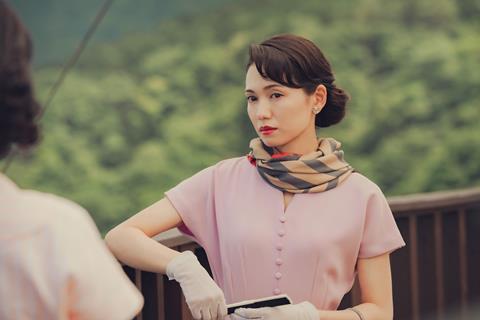Kei Ishikawa directs a dual timeline between 1950s Japan and 1980s England

Dir/scr: Kei Ishikawa. Japan/UK/Poland. 2025. 123mins
The fall-out from the atomic bomb that was dropped on Nagasaki has an afterlife that extends through generations in this mannered and stilted adaptation of Kazuo Ishiguro’s debut novel. In early ’80s Britain, in a chintzy corner of the home counties, Niki (Camilla Aiko), a 20-something British-Japanese aspiring writer interviews her Japanese mother Etsuko (Yoh Yoshida) about her former life in Japan. The memories of Nagasaki in the 1950s are vivid, the colours heightened and almost hallucinatory at times – Suzu Hirose plays Etsuko as a young woman, Fumi Nikaido is her friend Sachiko. But it becomes increasingly clear that the memories are unreliable, building to a twist that is superficially interesting but which doesn’t hold up to scrutiny.
Thoroughly tangled up in its layers of deception and ambiguity.
Ideas of malleable identity and serpentine storylines clearly fascinate director Kei Ishikawa, who adapted the screenplay from Ishiguro’s book. His previous work includes Gukoroku - Traces of Sin (2016), about a journalist delving into a cold case and the Venice-premiering A Man (2022), a slippery and intriguing legal drama which went on to win a host of awards including best director at the Japanese Academy Awards.
This latest film contains plenty of confounding twists in its dual timeline structure which leave us questioning the veracity of various story elements. But it lacks the crucial and satisfying click when the whole structure finally slots into place. In fact, rather than offer a neat perspective on the story, the final reveal undermines large chunks of the plot. Nobel Prize winner Ishiguro’s name should be a selling point for international audiences; Suzu Hirose (Our Little Sister, The Third Murder) will likely be a draw domestically. But while A Pale View of Hills should secure further festival slots, it may struggle to make an impact theatrically.
We are introduced to Etsuko as a dutiful and submissive wife to Jiro (Kouhei Matsushita) in Nagasaki, 1952. Her father-in-law has unexpectedly descended for a visit, but Etsuko takes it in her stride, welcoming the old man with considerably more grace than her husband. It’s a relatively comfortable life – she is pregnant with her first child, and Jiro works long hours to provide for them. “It’s almost as if it never happened,” she says at one point as she surveys the richly forested landscape around the city.
Elsewhere, the scars from the bomb that was detonated over the city in August, 1945, are plain to see, both physically (Mariko, Sachiko’s rebellious, cat-obsessed daughter, has burns on her arms that brand her as a social outcast) and mentally (Etsuko lied to her husband about her exposure and now worries about the health of her unborn child). Sachiko talks of escape, and a new start in the US. But as we learn from the second timeline, it’s Etsuko who eventually moves from Japan to the UK, with a British man she met while working as a translator. Niki attempts to coax the story from her mother, but both women find themselves dwelling on Etsuko’s other daughter Keiko, Niki’s older half sister, who moved to the UK from Japan as a young child but took her own life some time in the past.
The inconsistencies in Etsuko’s version of the story might be deliberate or they could be an unconscious distortion, an attempt to deflect the guilt and pain which is a legacy for many of the survivors of one of the most devastating events in 20th-century warfare. Memories can morph and reshape as a form of self-protection; not every lie is cynical and purposeful. But while the film toys with these themes and ideas, it gets thoroughly tangled up in its layers of deception and ambiguity.
Production company: Bunbuku, Thefool
International sales: GAGA Corporation intlsales@gaga.co.jp
Producers: Hiroyuki Ishiguro, Miyuki Fukuma, Stephen Woolley, Elizabeth Karlsen, Mariusz Włodarski, Marta Gmosinskae
Screenplay: Kei Ishikawa, based on the novel ’A Pale View Of Hills’ by Kazuo Ishiguro
Cinematography: Piotr Niemyjski
Production design: Hiroyuki Wagatsuma, Adam Marshall
Editing: Kei Ishikawa
Music: Paweł Mykietyn
Main cast: Suzu Hirose, Fumi Nikaido, Yoh Yoshida, Camilla Aiko, Kouhei Matsushita, Tomokazu Miura
























